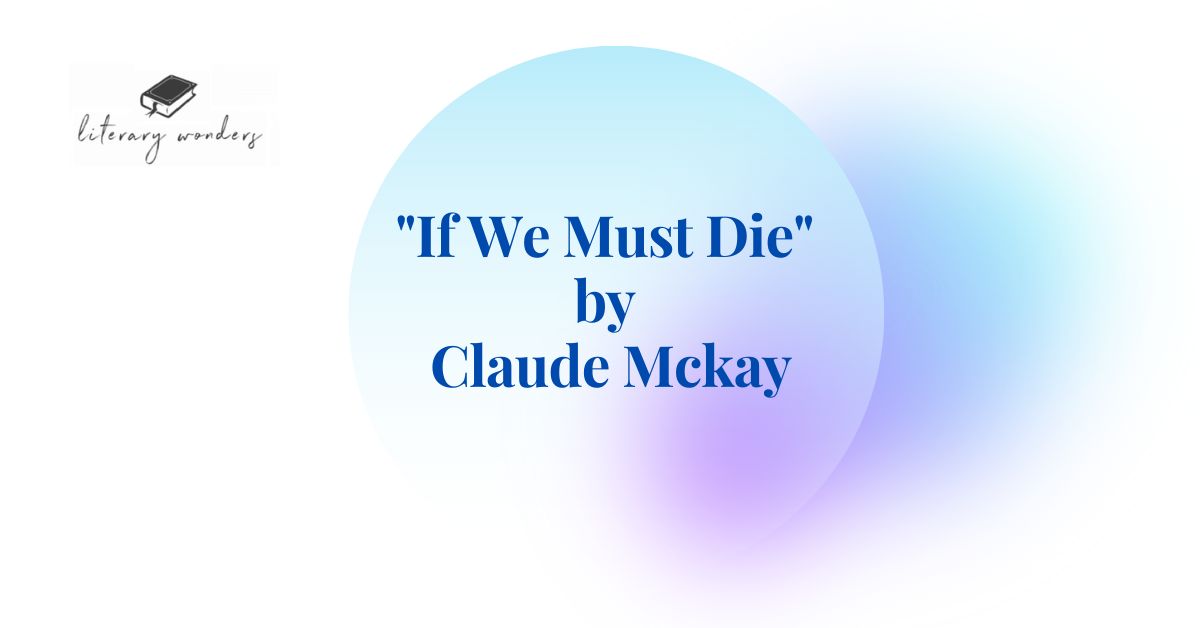Analysis of “If We Must Die” by Claude Mckay
“If We Must Die” is a powerful poem by Jamaican-American poet Claude McKay, written in 1919 during a time of racial unrest and violence in America. The poem speaks to the struggles and injustices faced by black people at the time and is often interpreted as a call to resistance and a plea for dignity in the face of oppression.
The poem opens with the famous lines, “If we must die, let it not be like hogs / Hunted and penned in an inglorious spot.” These lines set the tone for the rest of the poem, presenting a vivid and dramatic image of people willing to fight back against their oppressors, even if it means risking their lives. McKay urges his readers not to go down without a fight and not to be like “hogs” who are slaughtered without a second thought.
The second stanza builds on this theme of resistance, as McKay writes, “O kinsmen! we must meet the common foe! / Though far outnumbered, let us show us brave, / And for their thousand blows deal one death-blow!” Here, McKay calls for unity among black people, urging them to unite in the face of their common enemy. He acknowledges that they may be outnumbered but encourages them to fight back with courage and determination.
The poem’s final stanza takes a more philosophical turn, as McKay writes, “Like men, we’ll face the murderous, cowardly pack, / Pressed to the wall, dying, but fighting back!” This stanza emphasizes the idea of dignity in the face of death, as McKay encourages his readers to face their oppressors with the bravery and honor of true men. He acknowledges that they may be pushed to the brink but insists they should never give up their fight for freedom and justice.
To read the full poem, please click here.
Major Themes in the Poem
The poem uses a universal thematic strand. It expresses a powerful call to resistance and courage in the face of oppression and persecution, and its themes remain relevant today.
One of the poem’s primary themes is the struggle for equality and dignity. McKay uses vivid imagery of animals being hunted and killed to illustrate the experience of Black people being targeted and persecuted. However, he also asserts that even in the face of such brutality, they must fight back and resist. The poem encourages a spirit of defiance against those seeking dehumanization and oppression.
Another important theme in the poem is the power of unity and solidarity. McKay calls for all oppressed people to unite and fight for their rights, recognizing that strength in numbers is crucial in the face of adversity. He emphasizes the importance of standing together and refusing to be divided or conquered.
The poem also speaks to the human desire for self-preservation and the will to survive. McKay’s message is not one of blind, reckless courage but rather a call to use whatever means necessary to defend oneself and others from harm. He encourages people to hold onto hope and never give up, even in the face of overwhelming odds.
Lastly, the poem explores the concept of martyrdom and sacrifice. McKay acknowledges that the fight for equality may come at a great cost, including loss of life. However, he also argues that dying for a cause can be a powerful act of defiance and that the struggle for justice and freedom can continue even in death.
Literary/Poetic Devices Used in “If We Must Die”
Claude McKay’s poem “If We Must Die” is a powerful and stirring call to arms, filled with vivid and emotional language that is designed to inspire and uplift its readers. Throughout the poem, McKay employs a range of literary and poetic devices to create a sense of urgency and passion and to convey his message with maximum impact.
One of the most striking features of the poem is its use of vivid and evocative imagery. McKay paints a vivid picture of his subject matter, using words and phrases that appeal to the senses and help to bring his message to life. For example, he speaks of “hogshead[s]” and “fagot[s]” of wood, conjuring up images of oppressive conditions and the tools of violent retribution.
Another key element of McKay’s poetry is his use of metaphor and symbolism. The poem is filled with symbolic language, such as the repeated use of the word “hog” to represent the dehumanizing treatment of Black people and the metaphorical comparison of oppressed people to “beasts driven to a corner.” These metaphors help to make the poem more powerful and effective by allowing the reader to see the issue from a new perspective.
McKay also uses repetition and parallelism to emphasize his message and create a sense of rhythm and momentum. Repeated phrases such as “If we must die” and “Like men, we’ll face the murderous, cowardly pack” helps to create a sense of unity and solidarity among his readers while reinforcing the central message of the poem.
Finally, McKay uses rhetorical devices such as hyperbole and allusion to enhance his poetry’s impact further. For example, he speaks of “bullets singing” and “gashes…flood[ing]” to create a sense of violence and danger while also referencing the historical struggles of oppressed people throughout the ages.
Conclusion
In conclusion, McKay’s poem “If We Must Die” is a masterpiece of poetic language and technique, filled with powerful imagery, symbolism, and rhetorical devices. Its message of defiance and courage in the face of oppression has inspired generations of readers, and its use of language and form is a testament to the enduring power of poetry as a tool for social change.
Suggested Readings

